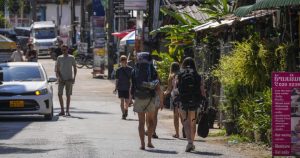Armenia aims to sign peace deal with Azerbaijan before COP29
Unlock the Editor’s Digest for free
Roula Khalaf, Editor of the FT, selects her favourite stories in this weekly newsletter.
A peace agreement between Armenia and Azerbaijan could be inked before Baku hosts the UN’s COP29 climate conference next month, according to the Armenian president.
Negotiations to end the decades-long conflict between the two countries have been tense, particularly after Azerbaijan last year seized the breakaway region of Nagorno-Karabakh in a brief but deadly military offensive that prompted an exodus of 100,000 ethnic Armenians.
Armenia’s president, Vahagn Khachaturyan, told the Financial Times that while there were outstanding issues that still needed to be agreed, “we are approaching the end” of the discussions, adding that deal could be signed before the UN climate conference in November.
“It would be good to sign it by COP29,” he said. “But let’s not run ahead of time.”
Last month, Azerbaijan called for a “COP truce”, asking countries to “to transcend political challenges, stand in unity and commit to the truce during the month of COP29”. The hosts of the UN’s flagship climate summit said they wanted to highlight the importance of peace, but have also been accused of delaying the peace talks.
Azerbaijan was announced as the host of COP29 last December, just months after seizing Nagorno-Karabakh. Armenia had initially vetoed its neighbour’s application and put itself forward as host, but dropped this as part of a trade between the two countries that saw Baku releasing more than 30 Armenian prisoners of war.
Azerbaijan has faced repeated criticism in recent months over human rights issues, including the jailing of political prisoners and critics of the government.
Khachaturyan said discussions about prisoners of war did not form part of the peace agreement talks, but “they remain in our agenda”. Any peace agreement was unlikely to fully address all of both countries’ concerns initially, but could be built upon, he added.
Speaking on the sidelines of the Hamburg Sustainability Conference, where world leaders discussed climate and development issues, Khachaturyan said Armenia needed to make peace with its neighbours after the country — and Nagorno-Karabakh — had spent decades in a “warlike situation”.
“It has not been a good result to live with dreams. We need to be pragmatic and realistic. We need to live in peace . . . not only with Azerbaijan but all neighbours.”
During a day of fighting in September 2023, the Baku government took control over Nagorno-Karabakh, a small mountainous enclave that had been under Armenian control since the collapse of the Soviet Union. Azerbaijan dissolved the self-proclaimed republic in January and started building new towns for Azeris to relocate to after most ethnic Armenians fled the region.
Khachaturyan said the roughly 100,000 refugees that arrived in his country “came without anything” and that the process of integrating such a large number of displaced people was a work in progress.
Armenia also planned to “keep its doors open” for refugees from Lebanon, where many ethnic Armenians live, if they were forced to leave as Israel steps up its campaign against Hizbollah, he said. “We will need to be ready for them.”
Armenia has increasingly hinted of closer ties with the EU, with Khachaturyan saying the two shared similar values and that an EU monitoring mission in 2023 on the borders with Azerbaijan had helped reduce friction in the area. But he played down suggestions that Armenia would apply for EU membership in the near future, while adding that the country was not looking to cut off its relationship with Russia.
#Armenia #aims #sign #peace #deal #Azerbaijan #COP29





